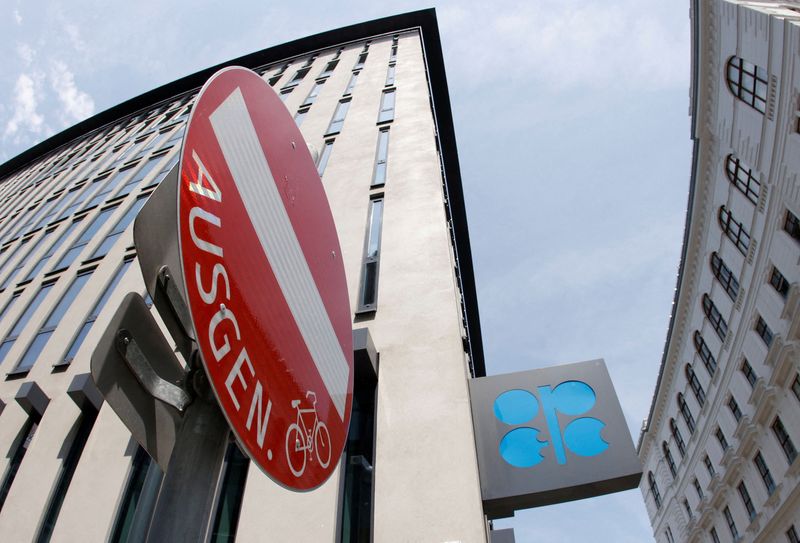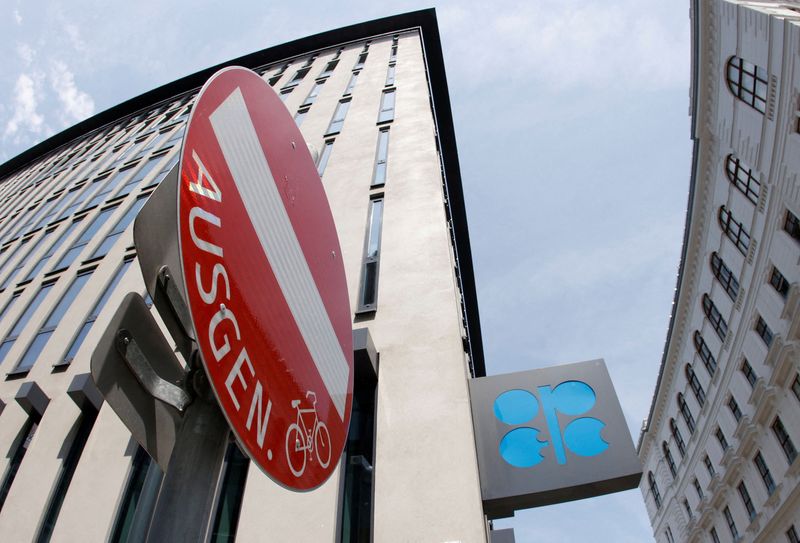Commodities
Explainer-Why calls for oil embargo on Israel are unlikely to go anywhere


© Reuters. FILE PHOTO: A view shows the logo of the Organization of the Petroleum Exporting Countries (OPEC) on their headquarters in Vienna, Austria, June 2, 2023. REUTERS/Leonhard Foeger/File Photo
By Ahmad Ghaddar
LONDON (Reuters) – Israel’s military offensive in Gaza that followed an Oct. 7 attack by the enclave’s ruling Islamist group Hamas has raised calls in the Middle East, particularly from OPEC member Iran, for using oil as a weapon to punish Israel.
The conflict has led many analysts, oil market watchers and politicians to draw parallels with the 1973 OPEC embargo, when Arab oil producers cut off oil exports to several allies of Israel, including the United States and Britain, following the Israeli-Arab war that year.
Analysts and OPEC sources, however, say that the energy world nowadays is far different from 50 years ago, playing down any possibility of a new embargo.
The Organization of the Petroleum Exporting Countries and its allies led by Russia, or OPEC+, meet in Vienna on Sunday to decide on output policy, and sources have told Reuters that additional output cuts are likely to be discussed.
WHERE ARE CALLS FOR EMBARGO COMING FROM?
Last month, Iranian Foreign Minister Hossein Amirabdollahian urged members of the Organisation of Islamic Cooperation (OIC) to impose an oil embargo and other sanctions on Israel and expel all Israeli ambassadors.
Four sources from OPEC, which produces a third of the world’s oil and includes several Muslim states including Iran, told Reuters at the time that no immediate action or emergency meetings were planned by the group in light of Iran’s comments.
On Sunday, Iranian Supreme Leader Ayatollah Ali Khamenei appealed to Muslim states that have normalised relations with Israel to cut them for at least “a limited time”, weeks after he called for an Islamic oil and food embargo on Israel.
During a joint summit between members of the OIC and the Arab League in Riyadh on Nov. 11, Muslim states did not agree to impose wide-ranging sanctions on Israel, as requested by Iranian President Ebrahim Raisi.
WHAT HAPPENED BACK IN 1973?
In 1973, Arab OPEC producers led by Saudi Arabia imposed an oil embargo on the United States in retaliation for its support for Israel in the Middle East war in October of that year. The embargo, and subsequent output cuts, soon added other countries as targets, including the Netherlands, Britain and Japan.
The embargo led to severe shortages with long queues forming at gas stations. The negative impact on the U.S. economy was significant.
The embargo led to a spike in oil prices, but over the longer term the crisis encouraged the development of new oil provinces outside the Middle East like the North Sea and deepwater assets, as well as alternative energy sources.
WHY IS ANOTHER EMBARGO UNLIKELY?
While Western countries were the main buyers of oil produced by Arab countries a half century ago, nowadays Asia is the main customer for OPEC’s crude, accounting for about 70% of the group’s total exports.
“The geopolitical environment is different compared to 50 years ago,” one OPEC source said about why a new embargo was not in prospect.
“A 1970s-style oil embargo by the Gulf oil-producing states appears unlikely because two-thirds of GCC (Gulf Cooperation Council) oil exports today are purchased by Asian clients and, importantly, the economic transformation currently planned and implemented in the region requires a sustained absence of conflict,” JPM Morgan said in a note.
Morgan Bazilian, director of the Payne Institute, said the energy landscape has changed substantially over the past 50 years. “The U.S. is now the largest producer of oil and gas, and has a long-established strategic petroleum reserve.”
Commodities
Oil prices rise; U.S. crude inventories plunge, Russia-Ukraine truce eyed
Commodities
India’s Reliance to stop buying Venezuelan oil over US tariffs, sources say
Commodities
Oil prices climb on Venezuela supply worries

 Forex3 years ago
Forex3 years agoForex Today: the dollar is gaining strength amid gloomy sentiment at the start of the Fed’s week

 Forex3 years ago
Forex3 years agoUnbiased review of Pocket Option broker

 Forex3 years ago
Forex3 years agoDollar to pound sterling exchange rate today: Pound plummeted to its lowest since 1985

 Forex3 years ago
Forex3 years agoHow is the Australian dollar doing today?

 Cryptocurrency3 years ago
Cryptocurrency3 years agoWhat happened in the crypto market – current events today

 World3 years ago
World3 years agoWhy are modern video games an art form?

 Commodities3 years ago
Commodities3 years agoCopper continues to fall in price on expectations of lower demand in China

 Economy3 years ago
Economy3 years agoCrude oil tankers double in price due to EU anti-Russian sanctions























